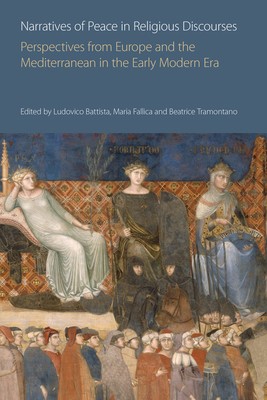
- We will send in 10–14 business days.
- Publisher: Equinox Publishing
- ISBN-10: 1800503881
- ISBN-13: 9781800503885
- Format: 15.5 x 23.4 x 1.9 cm, minkšti viršeliai
- Language: English
- SAVE -10% with code: EXTRA
Narratives of Peace in Religious Discourses (e-book) (used book) | bookbook.eu
Reviews
Description
In the Modern Age, the encounter and conflict between competing religious identities produced a renewed emphasis on the concept of peace, which was invested with religious, political and ideological connotations that still need to be investigated. This volume explores the role of religious discourse in the construction of the concept of peace from the Renaissance to the Enlightenment, analyzing the narratives which in Europe gave extrahuman value to peace, with a focus on the processes of idealization of peace and the relationship with the concept of toleration. The volume investigates crucial authors such as Nicholas of Cusa, Luis Vives, Pico della Mirandola, Erasmus of Rotterdam, Thomas More, Pierre Bayle, Benjamin Constant, who reflected on the problem of tolerance as an attempt to shape the relationship between confessions as a peaceful coexistence beyond doctrinal differences. The essays explore the extent to which religious conflicts within Christianity triggered a rhetoric of peace and tolerance/toleration, for instance in the case of the French Wars of Religion and the Revolt of the Netherlands. The rhetoric and imaginary field of peace in its religious connotations are then explored and analyzed in their apocalyptic (for Benivieni or Savonarola) or humanistic connotations (from Petrarca to Pico). The essays combine history, philosophy, history of religions and anthropology, with approaches that go from the historical-critical analysis of documents, to archive research, to comparative history to the analysis of the world of objects, that, following the "material turn", allows an alternative view on the narratives of confrontation and peace that presided over the intrareligious exchange.
EXTRA 10 % discount with code: EXTRA
The promotion ends in 22d.23:16:20
The discount code is valid when purchasing from 10 €. Discounts do not stack.
- Publisher: Equinox Publishing
- ISBN-10: 1800503881
- ISBN-13: 9781800503885
- Format: 15.5 x 23.4 x 1.9 cm, minkšti viršeliai
- Language: English English
In the Modern Age, the encounter and conflict between competing religious identities produced a renewed emphasis on the concept of peace, which was invested with religious, political and ideological connotations that still need to be investigated. This volume explores the role of religious discourse in the construction of the concept of peace from the Renaissance to the Enlightenment, analyzing the narratives which in Europe gave extrahuman value to peace, with a focus on the processes of idealization of peace and the relationship with the concept of toleration. The volume investigates crucial authors such as Nicholas of Cusa, Luis Vives, Pico della Mirandola, Erasmus of Rotterdam, Thomas More, Pierre Bayle, Benjamin Constant, who reflected on the problem of tolerance as an attempt to shape the relationship between confessions as a peaceful coexistence beyond doctrinal differences. The essays explore the extent to which religious conflicts within Christianity triggered a rhetoric of peace and tolerance/toleration, for instance in the case of the French Wars of Religion and the Revolt of the Netherlands. The rhetoric and imaginary field of peace in its religious connotations are then explored and analyzed in their apocalyptic (for Benivieni or Savonarola) or humanistic connotations (from Petrarca to Pico). The essays combine history, philosophy, history of religions and anthropology, with approaches that go from the historical-critical analysis of documents, to archive research, to comparative history to the analysis of the world of objects, that, following the "material turn", allows an alternative view on the narratives of confrontation and peace that presided over the intrareligious exchange.


Reviews